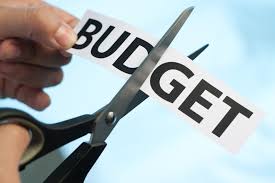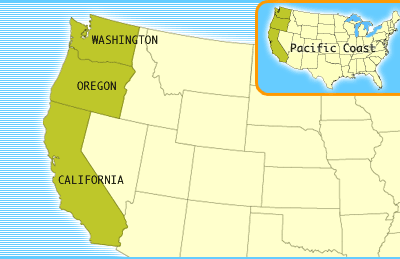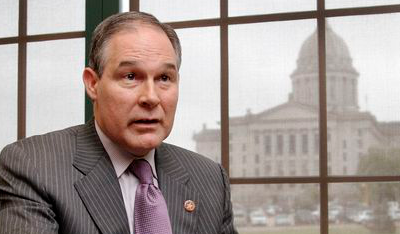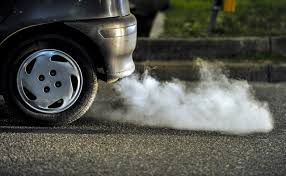Trump’s Environmental Budget
The proposal to Congress was released today. It's very bad news.
I've been posting budget news as it has come out. Now that we have Trump's proposal, I've replaced all the earlier information with the official numbers in this version. The bottom line: the budget would be a disaster for the environment, for science, and for the country. The general philosophy behind the budget was expressed by Trump's OMB Director: "As to climate change, I think the president was fairly straightforward: We're not spending money on that anymore,...
CONTINUE READINGEnv. Budget Update
The budget is an unfolding story. It's not looking any better right now.
Because budget news comes in stages, I'm planning to periodically update this post. Here’s what we know as of now. Material since the last update is in green. Environmental Science. I have posted previously about the threat to scientific research posed by the Trump Administration. The Administration’s attack on environmental science – climate science in particular – is now taking concrete form. NOAA’s Office of Oceanic and Atmospheric Research would l...
CONTINUE READINGThe Trump Administration’s False Stories About the Environmental Protection Agency Are Meant to Take the Agency Down
Donald Trump and Scott Pruitt Distort the Facts About EPA's Mission, History, and Success
The Trump Administration has made clear its plans to systematically dismantle the Environmental Protection Agency. Destroying the EPA will be a key element of the administration's fight, in the words of White House policy advisor Steve Bannon, to achieve the "deconstruction of the administrative state." [Update 8/22/17: Bannon is out, but that doesn't change the Administration's strategy or plans.] Republicans in Congress appear to support this effort. EPA Admin...
CONTINUE READINGWhat is the “Left Coast” Doing About Climate Change?
Quite a lot, as it turns out. But stronger coordination is needed.
The three West Coast states have a lot in common, including strong commitments to address climate change. They are all taking action on this front, but so far coordination efforts seem weak. Given the situation in D.C., it would make sense for these states to go further in terms of making a collective effort. It would also make sense to go beyond climate issues and start serious collaboration on other issues, such as how to protect public lands from the Trump Administr...
CONTINUE READINGPruitt Shows His True Colors
Still skeptical of climate science, EPA's regulatory authority, and the Paris Agreement.
Pruitt made conciliatory noises when he arrived at EPA. I suspect the honeymoon is over. On Thursday, he was asked on CNBC whether CO2 is the main cause of climate change. His answer? "“I think that measuring with precision human activity on the climate is something very challenging to do and there’s tremendous disagreement about the degree of impact, so no, I would not agree that it’s a primary contributor to the global warming that we see.” EPA's website s...
CONTINUE READINGThe Car Industry’s Rollback Effort — Disappointing But Not Surprising
The struggle to force the car industry to cut pollution goes back six decades.
The car industry is appealing for President Trump’s help against stricter carbon standards for cars. The industry’s action is disappointing for those who believed industry claims to embrace sustainability and technological innovation. There's no good excuse for the industry's about-face on a regulation it had originally agreed to. As one of the architects of the rule has pointed out, the industry is "now thriving, with record sales," and "it has easily exceeded th...
CONTINUE READINGCan California keep its federal lands public?
SB 50, introduced in State Senate, seeks to retain public ownership of federal lands in the state
There’s been a fair amount of national debate lately about whether federal public lands in the West should be transferred to state or private ownership. Rep. Chaffetz (R) from Utah had introduced a bill to transfer millions of acres of federal land in a range of Western states to private or state ownership – he withdrew that bill after pressure from hunting and fishing groups. Thus, the politics in DC – despite Republican control of Congress and the White House –...
CONTINUE READING“States’ Rights” and Environmental Law: California on the Front Lines
EPA's Assault on Air Quality Protection Will Aim at California's Standards, While Other States Have Given Up Their Authority to Protect Public Health and the Environment More Strictly
This article just published in the Atlantic explains well one of the many ways that EPA Administrator Scott Pruitt may attempt to deeply harm our environment for decades to come: through declining to grant, or revoking, the waivers that allow California to regulate air pollution from new motor vehicle engines more strictly than the federal government does. Less-well noticed is that while California has worked hard to protect public health and the environment throug...
CONTINUE READINGTrump’s Budget Cuts: Even Worse Than You Thought
As you dive into the details, things keep looking worse.
Trump is proposing huge cuts to EPA and other agencies. That's bad enough. We're beginning to learn more details, and the message is grim. While these cuts may not emerge from Congress at the end of the day, they do express the Administration's goals. In particular, they demonstrate that the Administration is deeply hostile to environmental science and that it lacks any interest in continuing to clean up our air and water. Here's what we know as of now: Enviro...
CONTINUE READINGWill There Be Guerrilla War at EPA?
Scott Pruitt's invasion of EPA probably won't be met with flowers.
Scott Pruitt has spent his career at war with EPA, and he has now invaded the homeland. What he encounters may look more like a guerrilla war than a bureaucratic surrender. To be blunt, it’s generally a mistake to expect an invading force to be greeted with flowers and hugs from the grateful inhabitants. Agencies like EPA will pose special difficulties for the Trump Administration, because the staff is massively alienated and hostile from the beginning. The depth o...
CONTINUE READING








